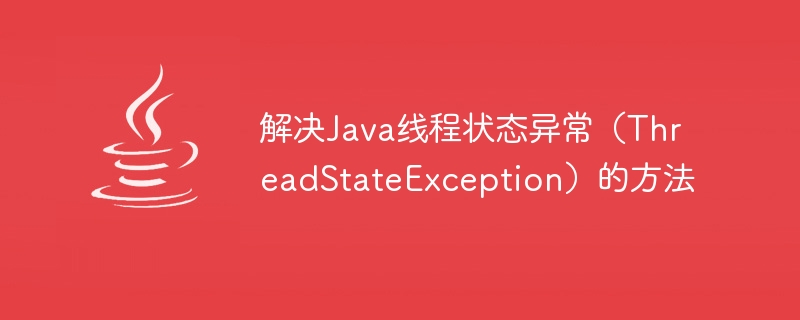

Methods to solve Java thread status exception (ThreadStateException)
Introduction:
When using Java multi-thread programming, you often encounter thread status exception (ThreadStateException) )The problem. When we call certain methods of the thread, if the state of the thread does not meet the requirements of the method, a ThreadStateException will be thrown. This article will introduce the causes and solutions of thread status exceptions, and give relevant code examples.
Cause:
Threads have different states at different times, including New, Runnable, Running, Blocked, Waiting, and Timeout Waiting (Timed Waiting) and terminating (Terminated), etc. When we call certain methods of a thread, the thread is required to be in a specific state. If the current thread state does not match the state required by the method, a ThreadStateException will be thrown.
Solution:
The main methods to solve thread state exceptions are as follows:
Reasonably manage thread state transitions:
When we create a new When a thread is running, start the thread by calling the start() method. At this time, the thread status changes from "new" to "runnable" status.
Thread thread = new Thread(myRunnable); thread.start(); // 启动线程
When a thread obtains CPU resources and starts execution, the thread status changes from "runnable" to "running" status.
class MyRunnable implements Runnable { public void run() { System.out.println("线程正在执行"); } }
When the thread execution ends or the stop() method is called, the thread status will enter the "terminated" state.
thread.stop(); // 停止线程
Properly handle thread sleeping and waiting:
When a thread needs to sleep for a period of time or wait for other threads to finish before executing, we can use the sleep() method to achieve this Sleep the thread, or use the join() method to wait for the thread.
try { Thread.sleep(5000); // 线程休眠5秒 } catch (InterruptedException e) { e.printStackTrace(); } Thread thread1 = new Thread(new MyRunnable()); Thread thread2 = new Thread(new MyRunnable()); thread1.start(); thread2.start(); try { thread1.join(); // 等待thread1结束 thread2.join(); // 等待thread2结束 } catch (InterruptedException e) { e.printStackTrace(); }
Use thread status related methods to judge:
Java provides some methods to judge the status of the thread. You can use these methods to judge whether the thread is in the correct state before calling the thread method. status to avoid thread status exceptions.
if (thread.getState() == Thread.State.RUNNABLE) { // 线程处于可运行状态执行相应操作 } else { // 线程状态异常,执行相应处理 }
Summary:
In Java multi-threaded programming, reasonable management of thread state transitions, processing of thread sleep and waiting, and use of thread state related methods for judgment are the best ways to avoid thread states. Exceptionally important method. They can be selected and used in combination according to specific needs, so that the status of the thread is always in a reasonable and required state, and problems caused by abnormal thread status are avoided.
The above is the method to solve the Java thread status exception. I hope it will be helpful to you.
The above is the detailed content of Methods to solve Java thread status exception (ThreadStateException). For more information, please follow other related articles on the PHP Chinese website!




